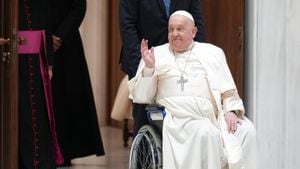The FIA's recent handling of swearing over team radio communications has raised eyebrows and sparked controversy within the motorsport community. On one hand, drivers are expected to maintain composure and professionalism, yet on the other, the adrenaline and pressures of high-speed competition often lead to emotional outbursts.
James Vowles, team principal of Williams Racing, expressed his support for the practice of swearing when the stakes are high. He pointed out the extraordinary conditions under which elite athletes, such as Formula E drivers, operate. "When you’re in the car and you’re asking some of the most incredible elite athletes in the world to put their life on the line, I think being aware they may use language that's sensitive at the time is expected," Vowles remarked, emphasizing the high-pressure environment faced by drivers.
This debate was ignited at the recent Formula E weekend held in Saudi Arabia, where Dan Ticktum, who previously drove for Williams, unleashed what could be described as a profane tirade—spouting approximately ten swear words over the team radio without facing any repercussions. Vowles acknowledged the situation and noted its potential to set a precedent for future behavior. "I think the precedent they’re going for is somewhat sensible," Vowles added.
Interestingly, Ticktum's lack of penalty is juxtaposed with the fate of World Rally Championship driver Adrien Formaux, who faced stiff consequences for his language during a televised interview. Formaux was fined €10,000, with the potential for another €20,000 fine hanging over him for using inappropriate language when he said they 'f***ed up'. This apparent inconsistency raises questions about how motorsport governing bodies enforce their rules.
Vowles contrasted the two situations, explaining, "There was a different matter to setting how we want us to be on a world stage in a calm environment." He suggested there should be distinct guidelines for acceptable language depending on the circumstance, highlighting the difference between the intensity of racing on the track and the professionalism expected during press interactions.
At the heart of this issue lies the broader conversation about how drivers are expected to communicate under duress. Many within the industry understand the humanity behind the emotions they experience, yet they also recognize the need for maintaining decorum, particularly when being watched by fans worldwide.
The FIA's reactions and policies can greatly influence the perception of motorsport culture—especially among younger fans and potential future drivers. Vowles posited, "When we’re asking these drivers to give everything they have, it’s unrealistic to expect them to remain entirely composed all the time." His comments may resonate deeply with those who appreciate the dynamic nature of competitive racing.
Despite the occasional cursing, Vowles and other leaders argue for the importance of standards. They assert this isn't merely about the words spoken, but also about the image of competitive racing as high-stakes and immensely challenging where emotions can and do boil over.
Race weekends often present fierce competition and, at times, heated exchanges, both among crews and between drivers, as they vie for position and success. To be human, after all, is to react; it is likely to hear expressions of frustration over the radio where split-second decisions can mean the difference between victory and defeat.
The challenge lies not only with the drivers but also within the governing bodies. Determining how to effectively moderate and regulate team radio exchanges without stifling the raw emotion of the sport remains on the agenda for the FIA.
Motorsport fans eagerly await how the FIA will address these issues moving forward. With varying standards being applied across different series—sometimes resulting in confusion and disillusionment—it will be interesting to see whether the organization opts for stricter controls or allows for more flexibility, reflecting the unpredictable nature of racing.
The line between passion and professionalism is tenuous. While heated moments may lead to colorful language, they also reveal the intensity of competition and the human aspect of racing. Understanding and balancing those facets remains key for the FIA and team leaders alike.



